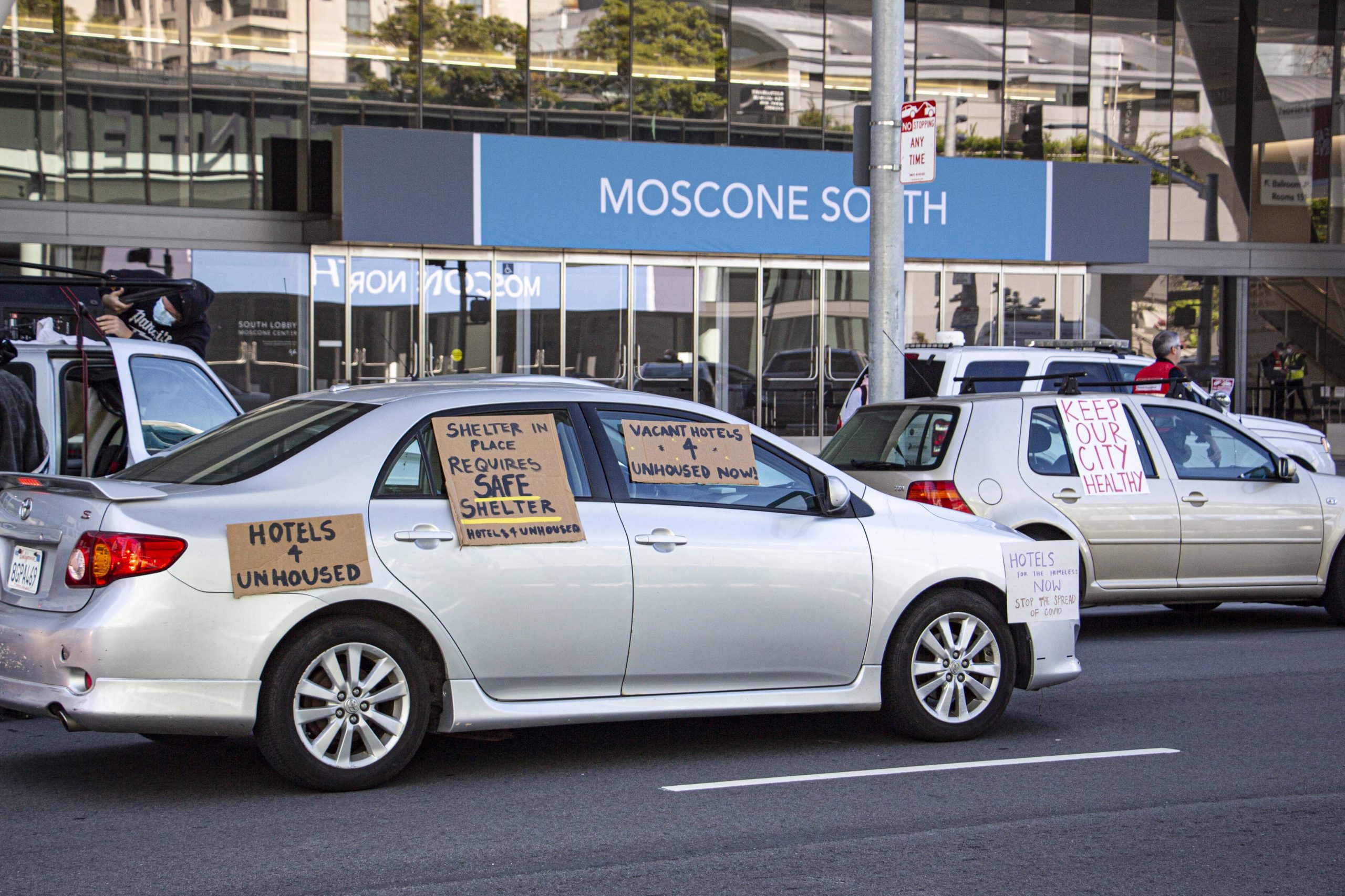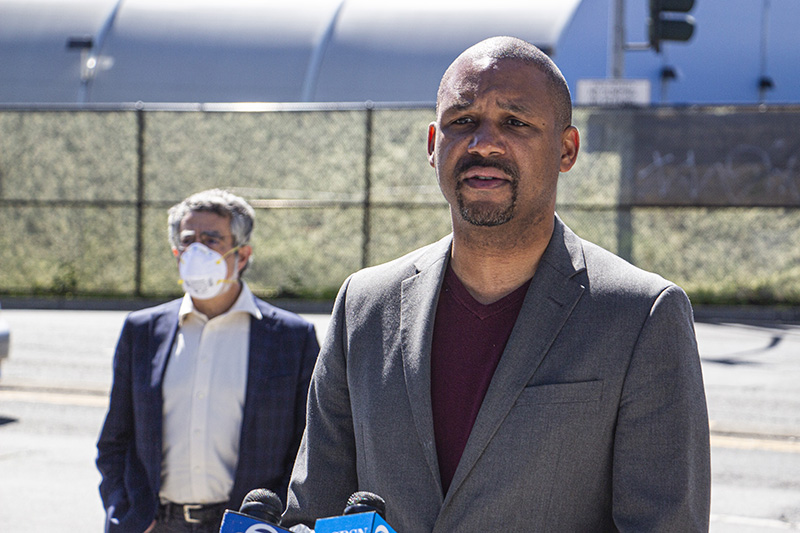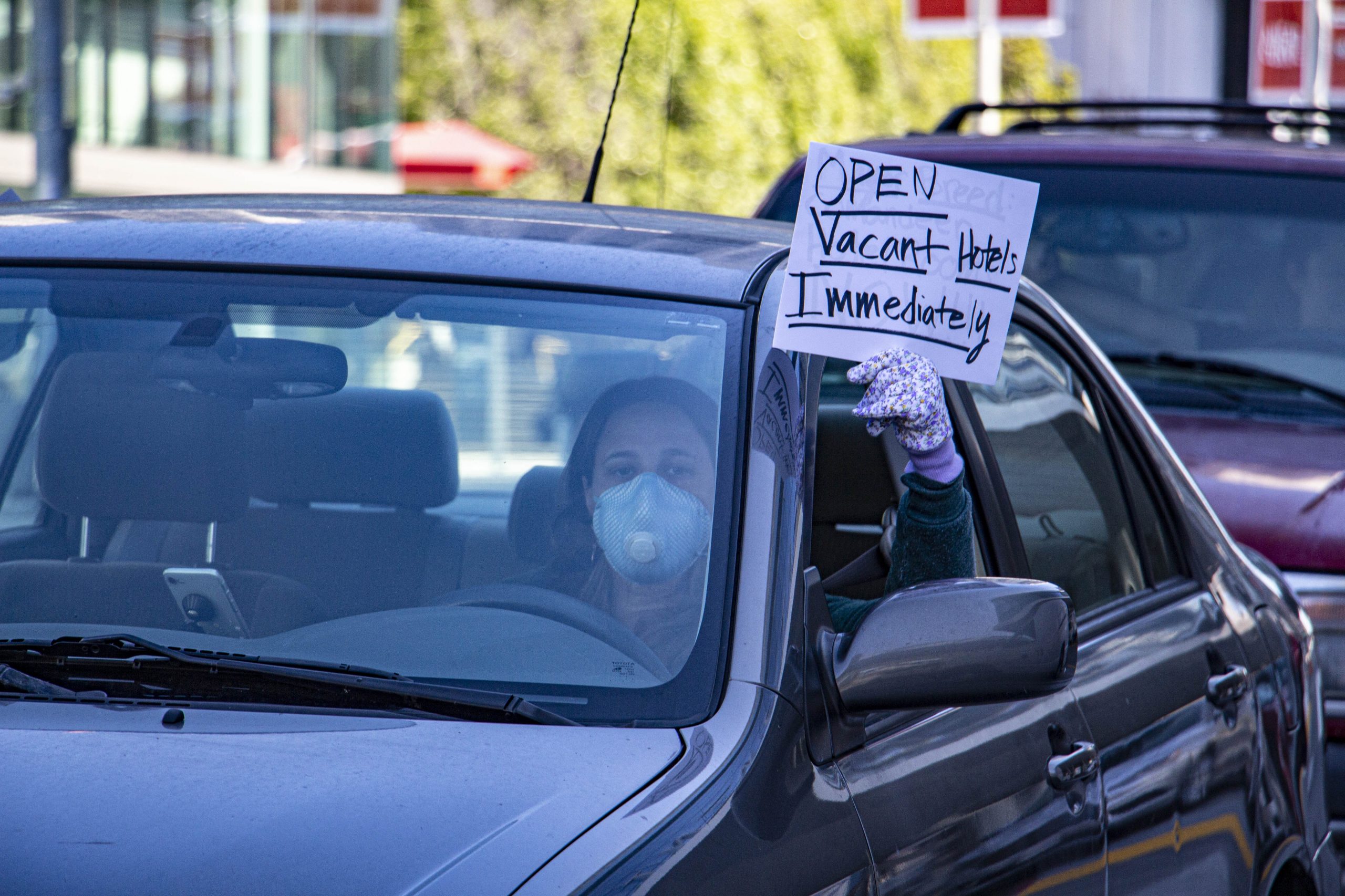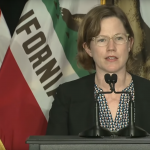The push to move San Francisco’s homeless residents into hotel rooms in response to the coronavirus gained urgency Thursday with the announcement of the first confirmed case of COVID-19 in a homeless shelter resident.
The diagnosis of a resident at the 186-bed Division Navigation Center has prompted the city to move 75 Navigation Center residents into hotel rooms because they might have been exposed to the virus.
City leaders have come to a consensus that some homeless people will be moved into hotels for public health purposes. The question is how many and how quickly. While five supervisors — Matt Haney, Hillary Ronen, Dean Preston, Aaron Peskin, and Shamann Walton — are advocating to set 1,000 hotel rooms aside for homeless people, Mayor London Breed has pushed back, citing logistical and financial challenges.
“This is something that was preventable,” said District 6 Supervisor Haney, who co-sponsored a Tuesday resolution passed unanimously calling for San Francisco’s Health Officer to issue an executive order to house homeless people in hotels. “The people in our shelter have to have access to the tens of thousands of hotel rooms in our city. This is something that the mayor can make happen right now.”
Activists from the Coalition on Homelessness and other advocacy groups on Friday donned face masks and circled Moscone Center South, where the city’s Emergency Operations Center is now based. They honked horns and held signs out of car windows to protest the city’s refusal to move unhoused people into hotel rooms unless they have been exposed to or tested positive for coronavirus.
“The city is moving way too slow to protect our unhoused neighbors,” Sarah Sherburn-Zimmer, director of the Housing Rights Committee, a tenant advocacy group, said from her car window. “If there was ever a time to act, it would be now.”
The supervisors will introduce an emergency ordinance at next Tuesday’s Board of Supervisors meeting to mandate 1,000 hotel rooms for people in shelters. But the ordinance, which will require eight votes to pass, may come too late. The ordinance would take at least three weeks before implementation, according to Haney’s office.
For Breed, the challenge is staffing for the hotels, the need to keep rooms available for vulnerable populations and health care workers, and financial resources. Human Services Director Trent Rhorer said in an email that the federal government would not reimburse the city for rooms given to those not deemed “vulnerable” and that in light of San Francisco’s projected $1 billion deficit, brought on by the pandemic, such an action would not be “fiscally prudent.”
“I want to be clear that the capacity and the resources in general needed to provide the wraparound supportive services for many of these populations make it very difficult to just open the doors and allow anyone to walk in,” said Breed, who noted that there may be challenges for housing people with addictions or mental illness.
Those who fall under the city’s definition of “vulnerable population” —people over 60 with health complications – will receive hotel placements. It is unclear what will happen to other shelter residents.
“Now I’m alarmed,” said Daniel Bench, a resident at the Division Circle Navigation Center at 224 South Van Ness Avenue, after hearing of the positive test. He also had not heard of any plans to relocate residents to hotels or other places. “It’s not a very healthy environment,” he said. “It’s so hard to stay healthy here because everyone’s always coughing.”

City departments were unable to provide the total number of positive cases among the homeless population.
Rhorer announced Wednesday that the San Francisco Hotel Council has offered over 10,000 hotel rooms for use during the COVID-19 crisis and that the number of hotel rooms leased could shoot up to 2,555 by the end of the week, but as of Friday only 195 homeless people had been placed into hotels, including the 75 moved from the Navigation Center.
“We have the hotel rooms. We have the money. We have the staff. Why wouldn’t we do this?” asked District 9 Supervisor Ronen. “We’ve been given every excuse in the book as to why this can’t happen. Why aren’t we doing what makes sense and could be saving lives?”
Homeless agencies offer to staff hotels
San Francisco service providers say they can resolve staffing concerns. The Homeless Emergency Service Providers Association has already developed a detailed plan on its own accord to place clients in hotel rooms and provide them support, including transportation, teletherapy and food coordination. Collectively, the group has identified 600 clients who could be placed in hotels immediately.

“Homeless service providers are at-the-ready to partner and help. If we had a commitment from the City, we could do this and put everyone safely inside,” said Mary Kate Bacalao, co-chair of the coalition. “I wouldn’t like to see us pathologize people and consider them somehow not ready to be inside because of specific support that they need. When we make the decision to put people first, the support comes directly after that.” She also noted that most clients would not need high-level staffing.
One hotel has already seen success in housing homeless families and women. Through privately funded efforts by Supervisor Dean Preston, 39 people living at two shelters in his district have been housed in the Oasis Inn at 900 Franklin St.
“They have been model residents,” said owner Naresh Dhadhal, who said his 59-unit hotel would be 100% vacant without the lease to house homeless people.
The hotel’s 10 staffers clean common areas daily and individual rooms once a week. Providence Foundation, which ran the two shelters where the hotel residents previously stayed, checks in daily with clients and distributes meals and groceries.
“It’s running smoothly. Hopefully the city expands the program,” said Dhadhal, who has previously used his hotel to provide long-term housing for families displaced by Hurricane Katrina. “The City needs to come forward and do something.”










